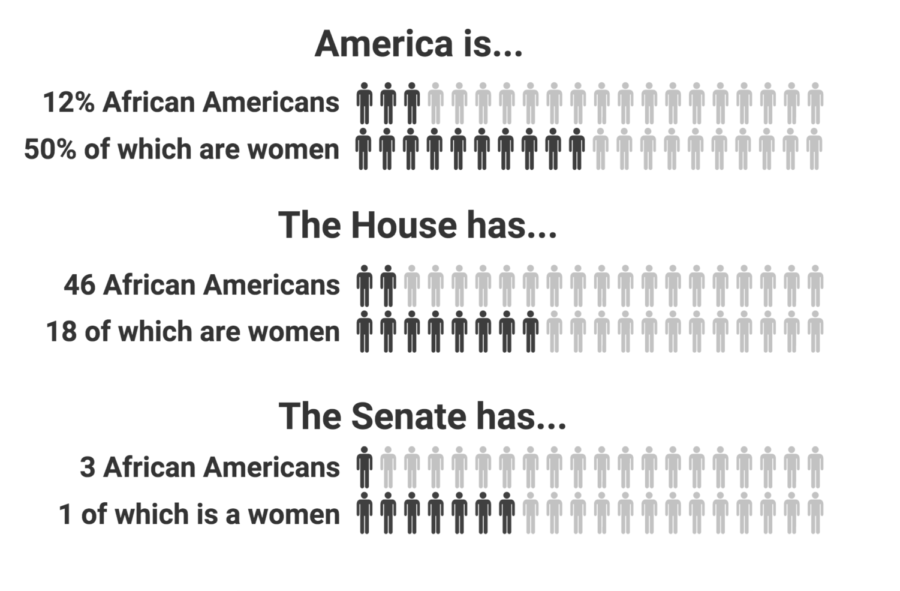2018 midterms could double the number of African American governors in American history
Infographic displaying the disparity between the number African Americans in American and in Congress, especially amongst women. Source: census.gov.
Former NAACP leader Ben Jealous, former Georgia Assembly Minority Leader Stacey Abrams and former Tallahassee Mayor Andrew Gillum are all running for Governor in Southern states in 2018. All of them are liberal Democrats. And most notably, all of them are aiming to set history by being the first African American governors in their states.
In 243 years of American history, there have only been 148 African Americans in the House of Representatives, 10 in the Senate, two on the Supreme Court, three in governor mansions and one in the White House. Because of this, the fact that three high profile African American candidates are running for governor is a significant increase.
According to Urban Director of Service Learning Amy Argenal, who frequently discusses issues of race in Service Learning classes, there is a systemic factor in why African Americans are so poorly represented. “In states like Florida, [a] fifth of African Americans can’t vote because of disenfranchisement,” Argenal said, pointing out the fact that if African Americans represent a disproportionately low amount of the electorate, then their ability to elect African Americans is limited. “Then you also have voter disenfranchisement in terms of voter ID laws and closures of DMVs, like in Texas. They close the DMV in communities of color to make it harder to get the ID to vote.”
Argenal also highlighted another cause of poor African American representation: voter bias. “Part of the system of racism is that implicit bias is ingrained in us since the time we are born,” Argenal said. “Do I think that plays out in voting? Of course. Some of it is implicit bias, but I think some of it was outright racism.”
Service Learning teacher Deborah Samake, who, like Argenal, teaches race-related issues, explained a significant factor in the absence of African Americans in higher offices: money. “[An] issue for African American candidates is finances. Who has the resources to run for office, especially the higher ones? Lots of funding comes from donors who prefer white candidates. There is some implicit bias in that African Americans disproportionately don’t have the finances to get their foot in the door,” Samake said.
Recent events, however, have galvanized African Americans to seek offices despite their various barriers. “I think the Trump administration has been oppressive, and a positive aspect of this is that it is making African Americans think ‘hey, if I want things to change, then I have to actively do it,’ and some of them are choosing to get involved in politics as a result,” Samake said.
The decades-long separation between the Trump administration and the civil rights movement has not only resulted in a new wave of African American candidates, but also a change in what it means to be an African American politician. Current African American politicians, such as John Lewis and James Clyburn, were elected in the decades following the Civil Rights movement, and they are older and less known for progressive stances than newer African American politicians such as Kamala Harris and Cory Booker.
“You have the Congressional Black Caucus (CBC) which is pretty moderate. So now you have these three young candidates who are not part of that movement. They are coming out of a young activist movement,” Argenal said.
The difference between the old guard and new guard of African American politicians is evident in the policies the trio supports and the politicians that support them in turn. Jealous has been endorsed by Senators Bernie Sanders, Kamala Harris and Cory Booker due to his support for liberal policies such as legalized marijuana, universal health care and a minimum wage of $15.
However, race and ideology are where the similarities between the three gubernatorial candidates end. The three Southern states they are running in have very different political histories. As a result, they are highlighting different campaign issues and have different chances of success.
Jealous seeks to oust Republican Larry Hogan as governor of Maryland. Although Maryland is a blue state, the race has been rated as “Likely Republican” by most political handicappers (organizations that predict elections) due to Hogan’s 66 percent approval rating in Maryland.
Meanwhile, Abrams is in an open race to replace Republican Georgia Governor Nathan Deal. One of the key points of her platform is expanding the Helping Outstanding Pupils Education Scholarship (HOPE), a massive merit-based college scholarship program based in Georgia. Her opponent is Georgia Secretary of State Brian Kemp. The race is rated as a toss up by some political handicappers.
The third and final African American gubernatorial candidate of 2018 is Andrew Gillum. Elected mayor of Tallahassee in 2014, Gillum won his primary against the more moderate Gwen Graham. Gillum is running against Trump ally and former representative of Florida’s sixth congressional district Ron DeSantis. This race is also rated as a toss up by political handicappers.
Win or lose, these three candidates have already revolutionized the presence of African Americans in politics. Samake summarized her feelings about the three candidates succinctly: “They are progressive, they are bold, and I see change coming.”












